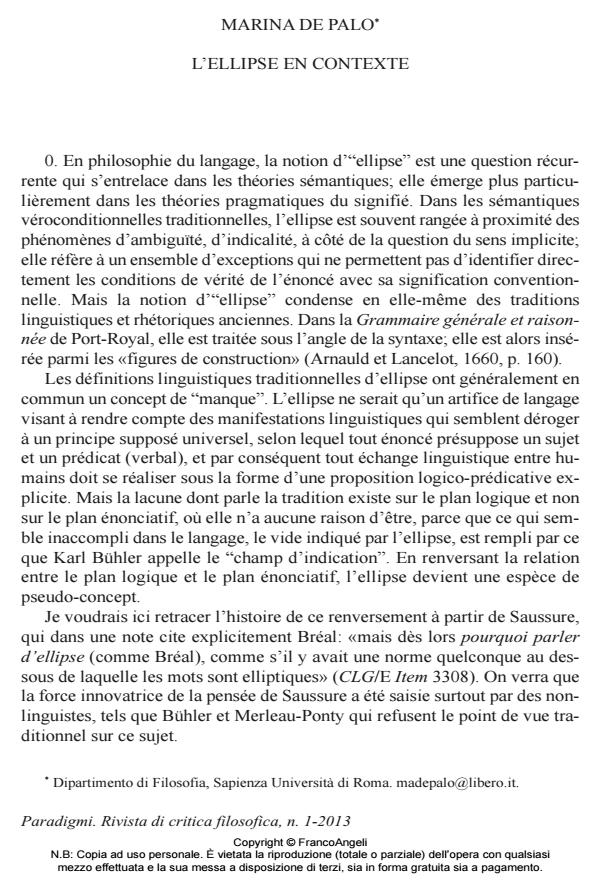L’ellipse en contexte
Titolo Rivista PARADIGMI
Autori/Curatori Marina De Palo
Anno di pubblicazione 2013 Fascicolo 2013/1
Lingua Italiano Numero pagine 12 P. 165-176 Dimensione file 159 KB
DOI 10.3280/PARA2013-001011
Il DOI è il codice a barre della proprietà intellettuale: per saperne di più
clicca qui
Qui sotto puoi vedere in anteprima la prima pagina di questo articolo.
Se questo articolo ti interessa, lo puoi acquistare (e scaricare in formato pdf) seguendo le facili indicazioni per acquistare il download credit. Acquista Download Credits per scaricare questo Articolo in formato PDF

FrancoAngeli è membro della Publishers International Linking Association, Inc (PILA)associazione indipendente e non profit per facilitare (attraverso i servizi tecnologici implementati da CrossRef.org) l’accesso degli studiosi ai contenuti digitali nelle pubblicazioni professionali e scientifiche
Le definizioni linguistiche tradizionali della nozione di ellissi hanno in comune il concetto di "mancanza", di "vuoto". Ma la lacuna esiste sul piano logico e non sul piano enunciativo, perché il vuoto indicato dall’ellissi è riempito da ciò che Bühler chiama "campo di indicazione". Ribaltando la relazione tra piano logico e piano enunciativo, l’ellissi diventa uno pseudo-concetto. Questo articolo cerca di disegnare la storia di questo ribaltamento a partire da Saussure, mostrando come la sua forza innovatrice sia colta e sviluppata soprattutto da Merleau-Ponty. Questo punto di vista non tradizionale ha molti punti comuni con le riflessioni di Wittgenstein: un altro non-linguista, insieme a Bühler e Merleau-Ponty.
Parole chiave:Campo deittico, Contesto, Ellissi, Enunciazione, Fenomenologia, Vaghezza.
- Sentence and its Parts. A Psycholinguistic Theory of Syntactic Value Lia Formigari, in Histoire Epistémologie Langage /2015 pp.9
DOI: 10.1051/hel/201501 - An “I” Locked in a Barrel “Would Not Know How to Speak”: Field of Experience, Dialogue, and Encroachment in Merleau-Ponty Marina De Palo, in Histoire Épistémologie Langage /2023 pp.19
DOI: 10.4000/hel.3341
Marina De Palo, L’ellipse en contexte in "PARADIGMI" 1/2013, pp 165-176, DOI: 10.3280/PARA2013-001011